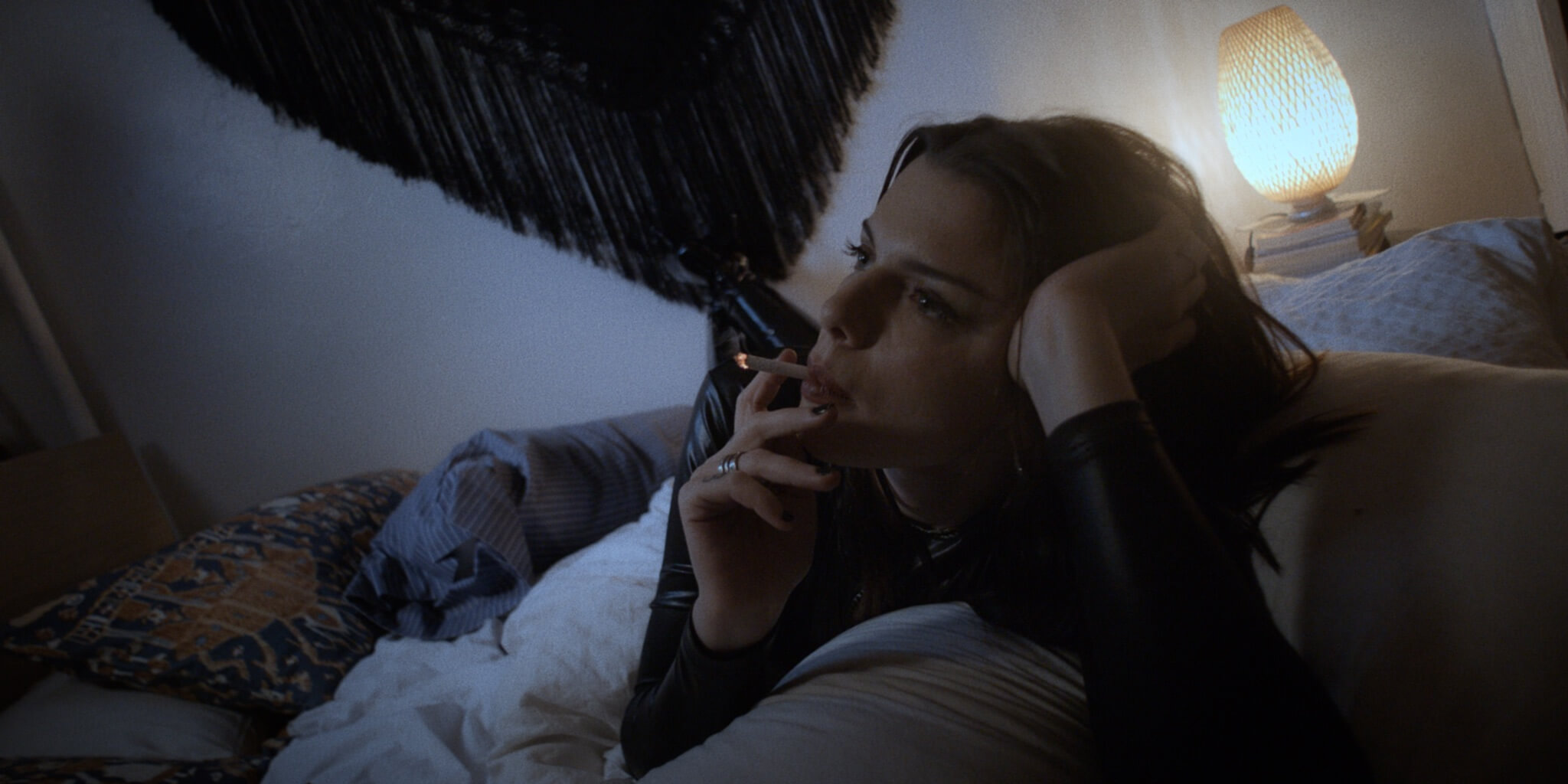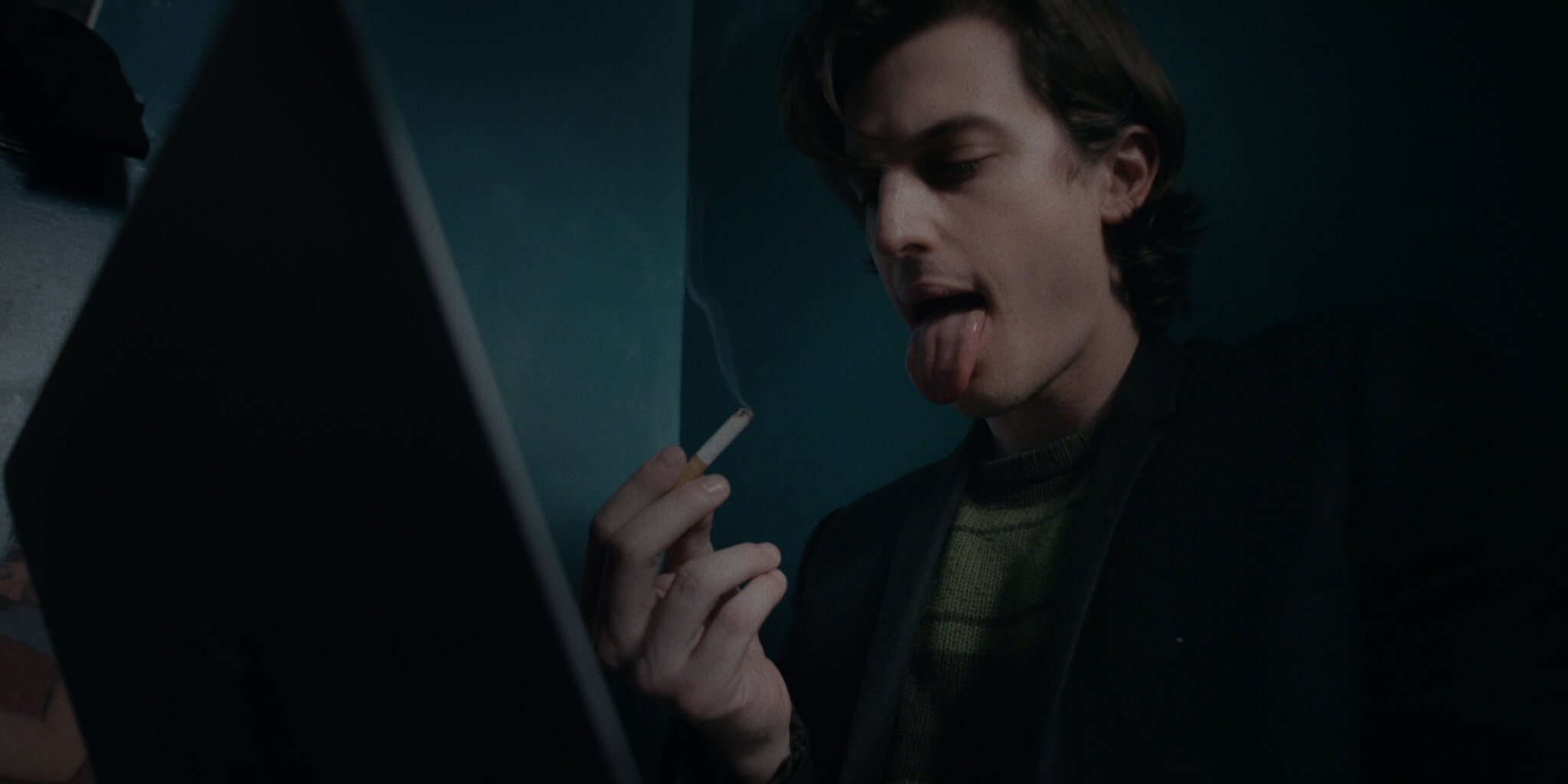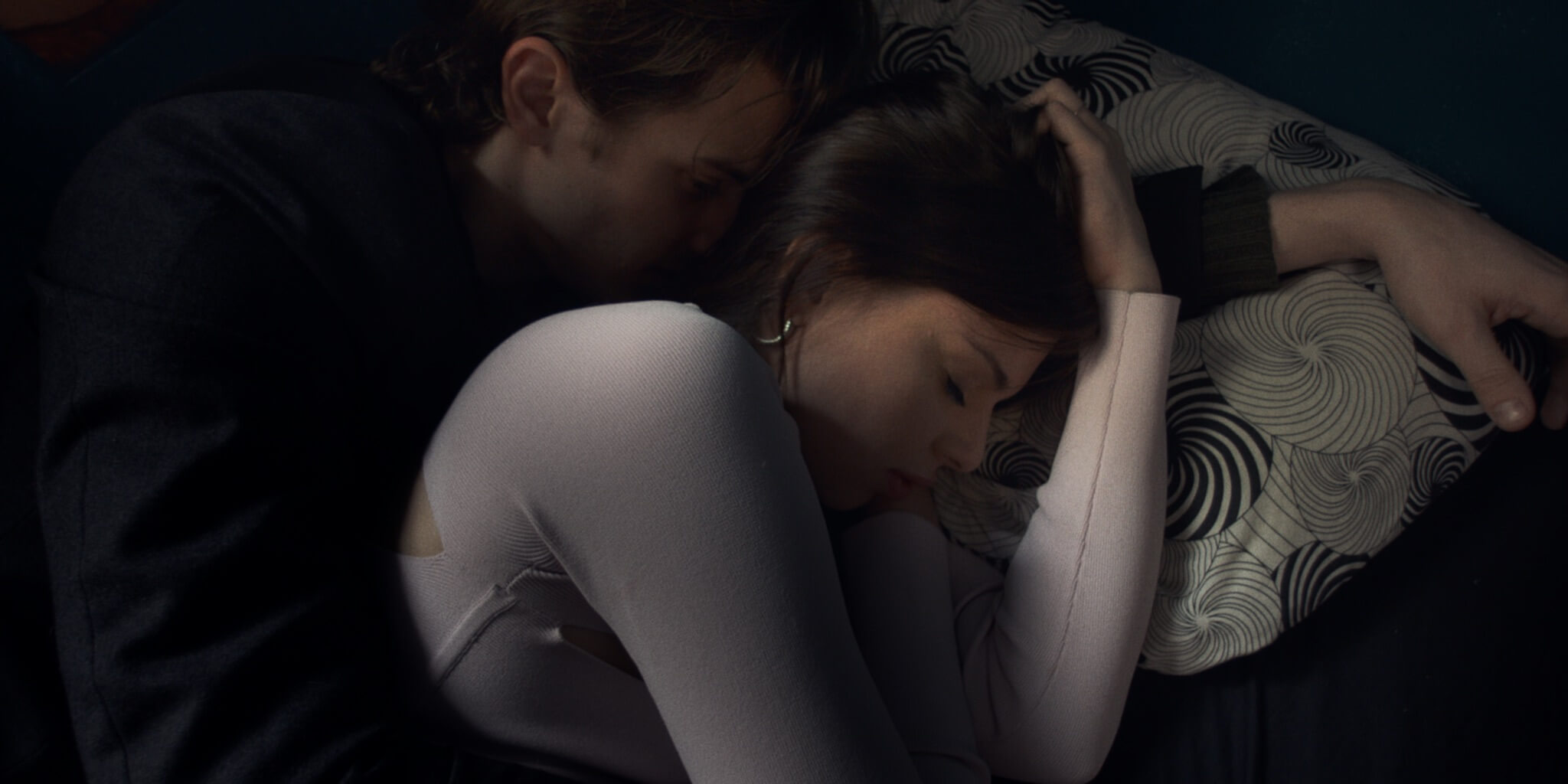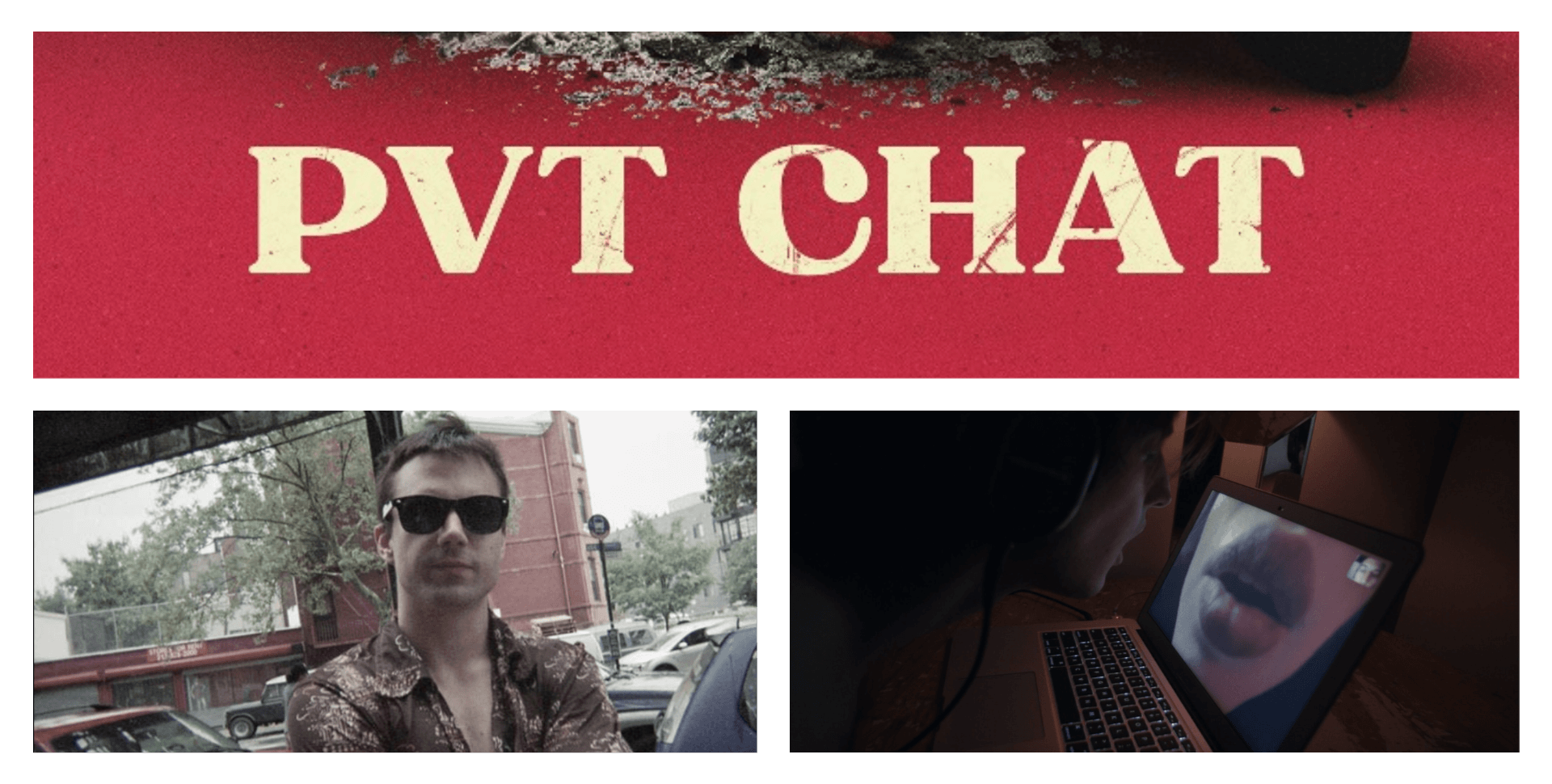The psychosexual drama film PVT CHAT follows the relationships between an online gambler, Jack (Peter Vack), and his favorite cam girl, Scarlet (Julia Fox). In a recent Q&A with Borrowing Tape, PVT CHAT's Filmmaker Ben Hozie shared his experience with working on multiple elements of the movie's production — screenwriting, directing, editing, and cinematography. PVT CHAT is released in theaters on February 5th and On-Demand & Digital on February 9th, 2021.
What was your inspiration for PVT Chat?
I was initially drawn to the world of online sex work and gambling because they both seem to really crystalize something essential about this historical moment where most emotion is processed quickly and easily through computer screens. I wanted to make a modern drama about a relationship that developed over the internet; one that showed both the negative and positive aspects of online relationships.
How did you approach the screenwriting process?
I like writing first drafts that are more free-associative. I like to set aside a particular amount of time — something like two weeks — for sustained writing to bang out a first draft. In the beginning, I have certain scenes or set pieces that I’ve been dreaming about in my head, but I often don’t know how to arrive at them organically. Having a rough outline certainly helps, but I don’t like to begin the outline until the second draft, where I’ll completely rewrite the entire thing. Often those initial scenes that made me want to make the movie in the first place have to be cut. The spontaneity of letting my fingers hit the keys reveals more interesting things than anything premeditated. The most important thing to get right in a draft is clarity of tone. That’s where getting critical readers becomes important. If my friends cannot tell what a certain scene is supposed to feel, smell, and taste like, then I haven’t done my job. I’m not saying that ambiguity doesn’t have a place in narrative cinema, but it must be a specific ambiguity.

In PVT Chat, the main characters act in a transactional and exploitative way to attain what they ultimately want from another (money/sex/love) and have their boundaries crossed in the process. "Every relationship is exploitative." Can you tell us a little more about this theme?
This idea that ‘all relationships are based on exploitation at its surface seems like a Marxist critique since it implies that under capitalism all relationships get reduced to [a] transaction. In a different kind of society perhaps this wouldn’t be the case. This is probably true. However in the movie when Jack articulates this theory, it is coming from less of a well-considered philosophical position, but more from an emotionally wounded place. In some ways, this theory is the rationalization of a certain kind of depression where one is unable to love because they don’t trust themselves or anybody. I wanted the movie to get people to question their own relationships — to see that perhaps some of them are more exploitative than they previously considered but, I also wanted the movie to debunk this nihilistic theory. There many scenes in the movie that show people genuinely connecting. Despite what Jack says, I don’t think he really believes his theory, and I certainly don’t. I like making movies because I like experiencing heightened moments with people.
What was the casting process like, and did the sexually-explicit nature of PVT Chat factor into casting? [Personally, I thought that Julia Fox and Peter Vack were brilliant choices for Scarlet and Jack.]
I didn’t really do a big open casting call (although we did audition a few other Jack’s early on). I cast most of the actors through watching and admiring other independent films. I met Peter during the shooting of an experimental short film that our producer Oliver David directed back in 2014 that I assisted with, and I met Julia through her agent (who also represents Keith Poulson). At the time, Julia had never acted — she filmed "Uncut Gems" after the initial principal photography for PVT CHAT — but had decided that she wanted to give it a go and had enough charisma and downtown cool to have already landed an agent. Certainly one couldn’t play either of these characters (especially Jack) if they weren’t comfortable with a certain level of on-screen nudity. I was especially lucky to work with Peter since his part was so physically demanding. He was completely willing to go the extra mile every day of the shoot to do what was right for the character and the film regardless of how it made him look. He isn’t a vain actor in the sense that he isn’t worried about his appearance on screen. He is always interested in the truth of a situation. If the movie works at all it is 95 percent due to Julia and Peter and the energy between them.

Which scenes from PVT Chat are your favorite? How long did production last?
The initial shot in 2018 was around 19 days, I believe. We did four days of reshooting in 2019 as well. There are a few moments that I think I got really right in the film — I love the sequence halfway through the film where Scarlet shows Jack her paintings. Julia and Peter are both incredibly tender and funny there. I also love it when Jack is gambling with the painter Will, and the landlord comes in to try to quiet them down. A different kind of filmmaker would have cut that scene, but it always made me smile and seemed to really reveal something about Jack’s personality. The actor who plays Will (Kevin Moccia) is a great friend of mine — he’s been in all three of my features, and he’s a riot there. I also am particularly proud of the ending in the motel. It feels just right to me.
How did you handle writing and directing the sex scenes in particular?
They were heavily blocked out beforehand almost as precisely as one would block out an action sequence. I wanted the actors to know exactly what to do so that the gestures in the scene could be precise, and also so that the actors could feel as comfortable as possible. When the camera was actually rolling, only the absolutely essential people remained on-set: me (with the camera on my shoulder), an assistant camera person fulling focus, and the boom operator.
What was the editing process like, and can you tell us what didn't make the final cut, and why?
It took me quite a while to edit because my rock band (BODEGA) was heavily touring throughout 2018-2019. I would watch clips and take notes in our tour van and in motels but, I only was really able to work on the movie when I was home in NYC. When I edit my own work, I don’t follow the blueprint of the script exactly and instead rearrange scenes and discover new structures that the footage seems to reveal. I am a very process-oriented filmmaker; I tend to re-shoot scenes during principal photography. This often leads to thrilling discoveries but also requires that I be okay with cutting good moments. There was an entire subplot from the film that ended up being cut featuring Jack’s relationship with an actual app developer (played by Andrew Wells Ryder) — that was quite funny but didn’t really fit in with the tone of the rest of the movie.

On top of writing, directing, and editing the movie — you were also the cinematographer for the film. The handheld camera gave an intimate feel without being exploitative — ironic, and yet fitting due to the subject and themes in the film.
What camera did you use to film, PVT Chat? Can you tell us about your aesthetic choices/inspirations?
It was a SONY with an Odyssey mount, so we could shoot in 4k with mostly one lens: a 16mm wide-angle glass. I love the way that lens renders space; it distorts everything slightly like a webcam would and exaggerates the depth of field. I wanted the audience to feel a sense of the space in Jack’s world. I wanted them to know the size of his apartment and the touch of his laptop. I was heavily inspired by the use of wide-angle glass in Terrence Malick’s last three or four films, and also Wong Kar Wai’s Fallen Angels.
Which films/directors have influenced you as a filmmaker and your film, PVT Chat? What are some of your favorite movies from the past decade?
These are my current favorites from the past decade:
To the Wonder (Malick, 2012)
First Reformed (Schrader, 2018)
Goodbye to Language (JLG, 2014)
The Wolf of Wall Street (Scorsese, 2013)
Love (Noe, 2015)
Drinking Buddies (Swanberg, 2013)
Thou Wast Mild And Lovely (Decker, 2014)
Madeline’s Madeline (Decker, 2018)
Seven Weeks (Obayashi, 2014)
Margaret (Lonergan, 2011)
Results (Bujalski, 2015)
Uncut Gems (Safdies, 2019)
Knight of Cups (Malick, 2015)
Kaili Blues (Bi Gan, 2015)
Sorry to Bother You (Boots Riley, 2018)
Uncle Boonmee Who Can Recall His Past Lives (Apichatpong, 2010)
The Future (July, 2011)
Hellaware (Bilandic, 2013)
Which themes and subject matters interest you as a filmmaker?
The question I always come back to is ‘how do you live an authentic life?’ Each film I’ve made comes at that Q from a different angle. I like characters that want something more out of life. Jack and Scarlet are both lost in different ways but are searching for something better.
Related: Review of PVT CHAT
Watch PVT CHAT now via Apple TV
